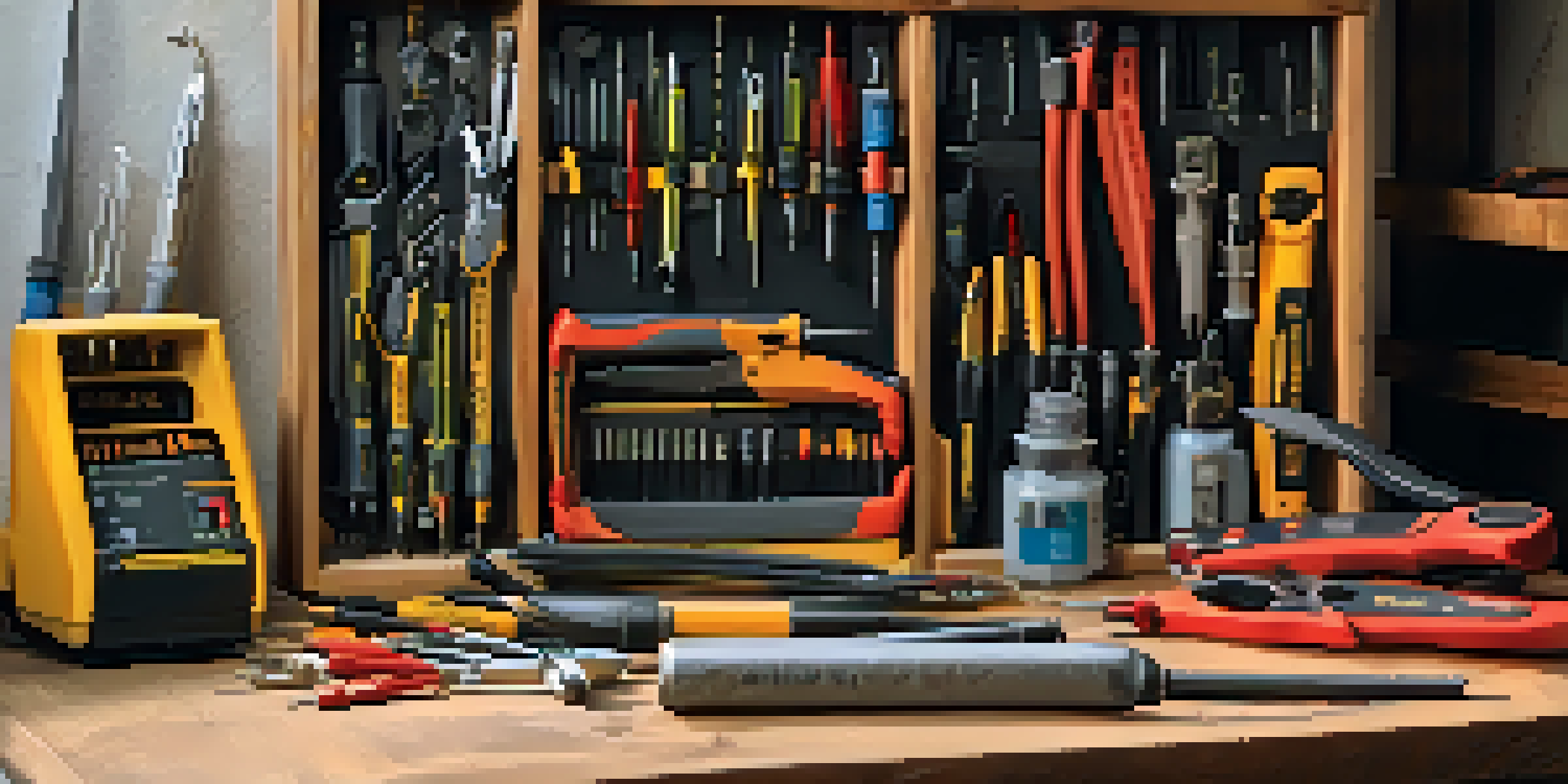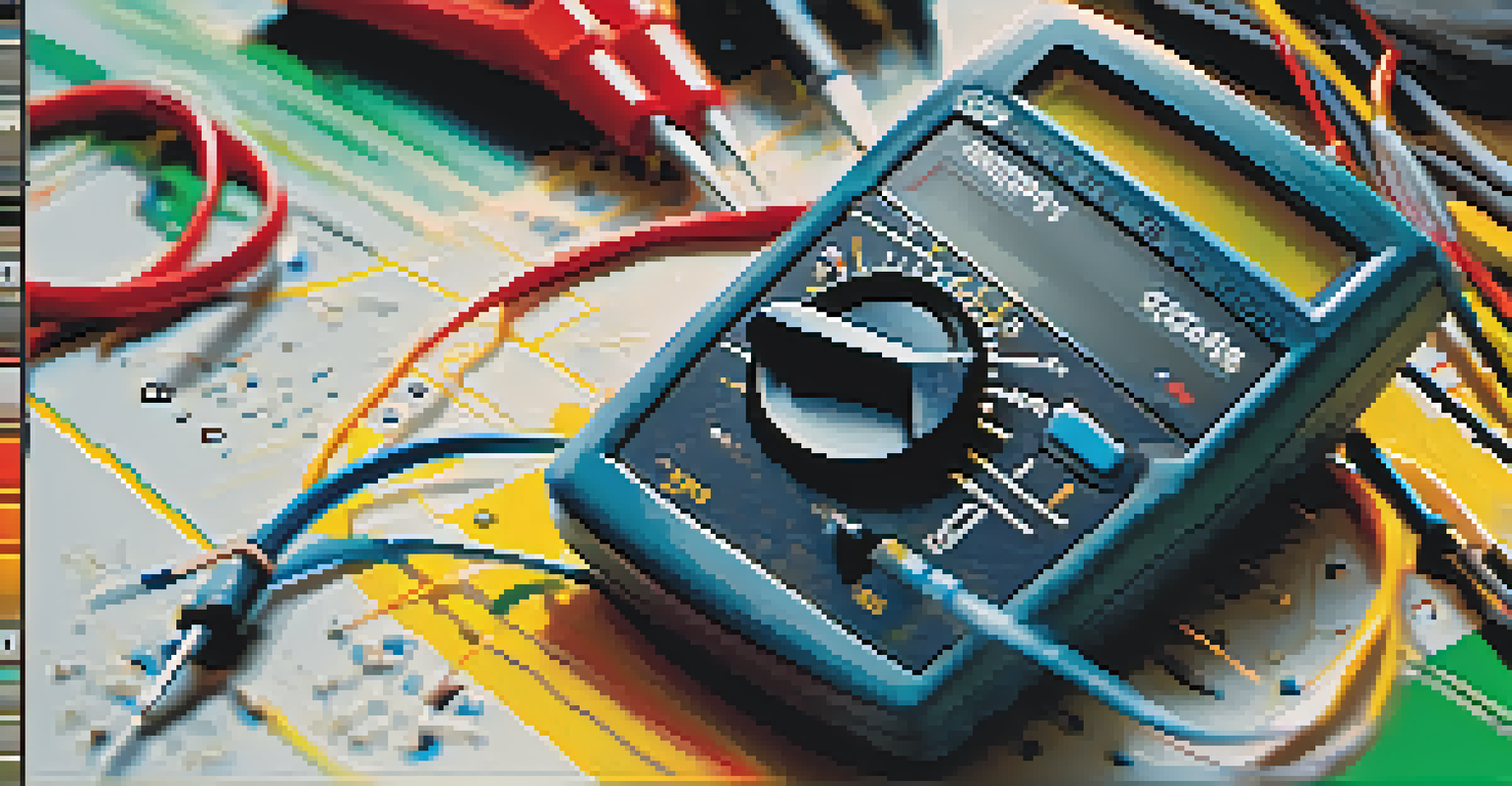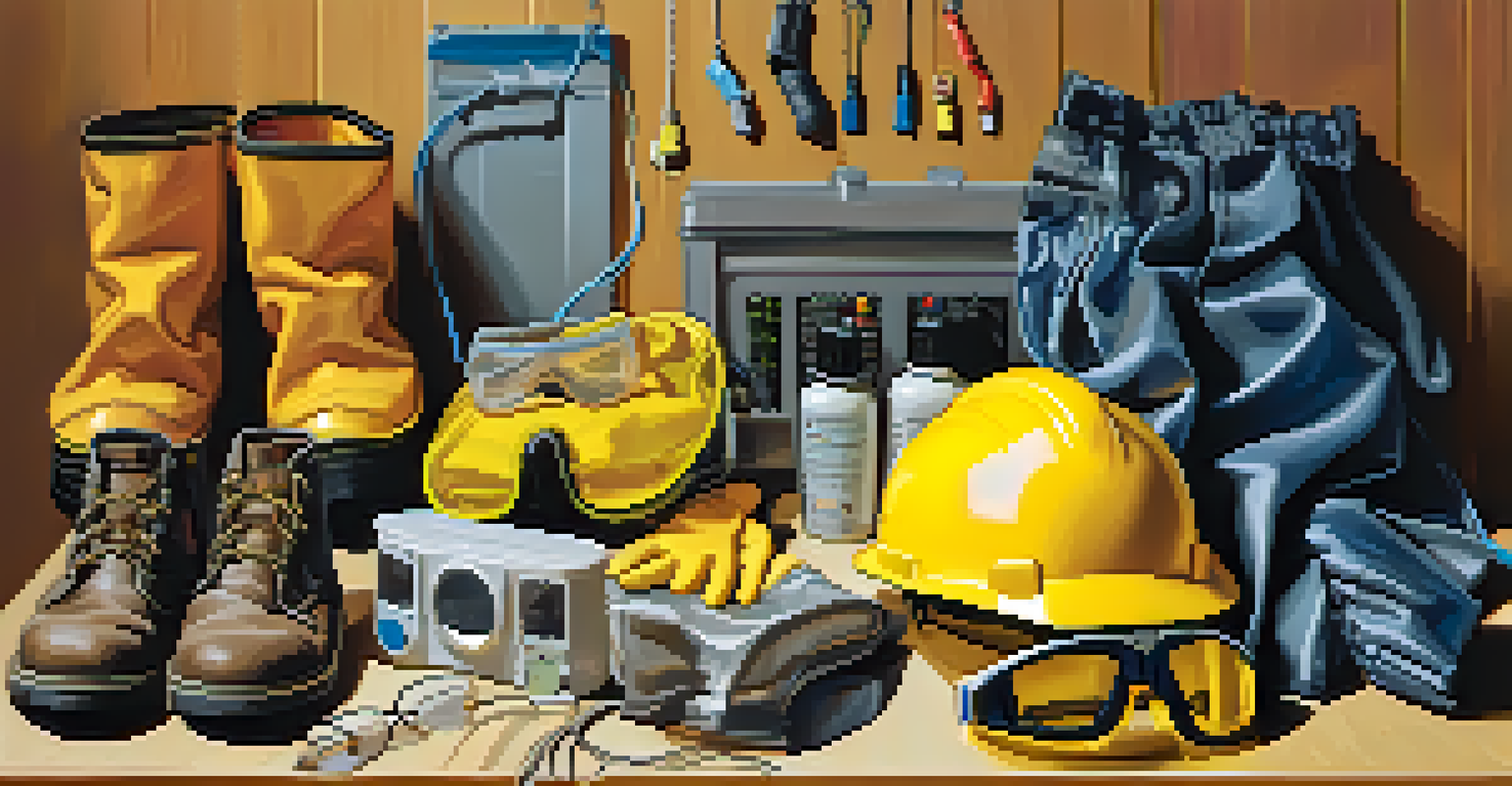The Essential Tool List for Home Electrical Repairs

Understanding the Basics: Why Tools Matter in Electrical Work
Having the right tools is crucial for anyone looking to tackle home electrical repairs. It not only makes the job easier but also ensures safety and efficiency. A well-equipped toolbox can save you time and prevent unnecessary headaches.
The right tools make all the difference between a successful project and a disaster.
Imagine trying to fix a leaky faucet with only a butter knife—frustrating, right? The same principle applies to electrical work. Using the proper tools allows you to address issues confidently, whether you're replacing a light switch or troubleshooting a circuit.
Moreover, investing in quality tools can lead to better results and durability. When you have reliable equipment on hand, you’ll feel empowered to take on various electrical tasks around the house without hesitation.
Safety First: Essential Personal Protective Equipment (PPE)
Before diving into any electrical project, your safety should be the top priority. Personal protective equipment, or PPE, is essential to keep you safe from potential hazards. Consider items like safety goggles, gloves, and insulated footwear as your first line of defense.

For example, safety goggles protect your eyes from flying debris, while insulated gloves help prevent electric shocks. Just like a chef wouldn’t enter the kitchen without an apron, you shouldn’t approach electrical repairs without proper PPE.
Tools Enhance Safety and Efficiency
Using the right tools not only simplifies electrical repairs but also ensures safety and efficiency in your work.
Investing in good-quality PPE not only enhances your safety but also gives you peace of mind. Knowing you’re protected allows you to focus on the task at hand, ensuring both your safety and the successful completion of your project.
The Multitasker: A Reliable Screwdriver Set
A good screwdriver set is an absolute must in any electrical toolkit. Whether you’re removing faceplates or securing electrical boxes, having both flathead and Phillips screwdrivers on hand will cover most of your needs. Think of them as the Swiss Army knife of tools; versatile and indispensable.
Safety isn’t just a set of rules; it’s a mindset.
For instance, when you’re dealing with different types of screws, having multiple sizes and types can save you time and prevent frustration. Using the wrong screwdriver can strip screws and damage your projects, which is a headache you want to avoid.
Moreover, look for screwdrivers with ergonomic handles for added comfort and grip. This small detail can make a significant difference, especially during lengthy repair sessions, ensuring that your hands don’t tire out too quickly.
Measuring Success: The Importance of a Quality Multimeter
A multimeter is an essential tool for diagnosing electrical issues. This handy device measures voltage, current, and resistance, allowing you to troubleshoot with precision. Think of it as your electrical detective, helping you uncover the mystery behind faulty wiring or malfunctioning appliances.
For example, if a circuit breaker keeps tripping, a multimeter can help you identify whether it's due to an overload or a short circuit. It's much like using a stethoscope to listen for problems within the body; it gives you insights that are crucial for effective repairs.
Quality PPE is Essential for Protection
Investing in personal protective equipment (PPE) is crucial to safeguard yourself from potential hazards during electrical projects.
Investing in a quality digital multimeter will pay off in the long run. Not only will it improve your ability to diagnose issues, but it will also enhance your confidence in handling electrical repairs safely.
Wire Strippers: A Must-Have for Electrical Connections
Wire strippers are essential for any electrical repair involving wiring. These handy tools allow you to safely remove insulation from wires, ensuring clean connections for a secure fit. Without wire strippers, you might find yourself using a knife, which is both dangerous and inefficient.
Think of wire strippers as the scissors of the electrical world; they make your job easier and safer. Just like you wouldn’t use dull scissors to cut paper, using the right tool for stripping wires is crucial for effective results.
When selecting wire strippers, look for adjustable options that can handle various wire sizes. This versatility will make them a staple in your toolbox, allowing you to tackle a range of projects with confidence.
Circuit Tester: A Quick Way to Ensure Safety
A circuit tester is an invaluable tool for ensuring that electrical circuits are live or dead. It helps you safely determine whether a wire is carrying electricity, which is crucial before you start any repair. Picture it as your safety net, giving you peace of mind before you touch any wires.
For instance, before changing a light fixture, using a circuit tester can confirm that the power is off, preventing accidental shocks. This small step can make a world of difference in your safety and confidence during repairs.
Organization Boosts Repair Efficiency
An organized toolbox helps you quickly find the necessary tools, streamlining your workflow and enhancing your confidence as a DIYer.
When choosing a circuit tester, consider one with a clear display and audible alerts. These features can enhance your experience, making it easier to read results quickly and accurately, ensuring your safety every step of the way.
The Versatile Tool: Pliers for Gripping and Twisting
Pliers are one of the most versatile tools in your electrical toolkit, serving multiple functions from gripping to twisting wires. With different types available—such as needle-nose and wire-cutting pliers—there’s a tool for every job. Think of them as your 'hands' for electrical tasks, allowing you to manipulate materials safely and effectively.
For example, needle-nose pliers are perfect for working in tight spaces, while wire-cutting pliers make it easy to trim excess wire length. Using the right pliers can make tasks quicker and reduce the risk of damaging components.

When selecting pliers, look for those with comfortable grips and durable materials. This will ensure that they last through numerous projects and feel good in your hands, allowing for better control and precision.
Get Ready: Organizing Your Electrical Repair Toolkit
Having all the right tools is just the beginning; organization plays a crucial role in efficiency. An organized toolbox means you can easily find what you need when you need it, saving you time and frustration. Consider using a tool bag or a toolbox with compartments to keep everything in order.
For example, grouping similar tools together—like all your screwdrivers in one section and pliers in another—can streamline your workflow. This way, you won't have to dig around looking for that one elusive screwdriver when you’re in the middle of a project.
Additionally, keeping a checklist of essential tools can help you ensure that you're always prepared for any electrical task. This simple practice can turn you into a more confident DIYer, ready to tackle any electrical challenge that comes your way.